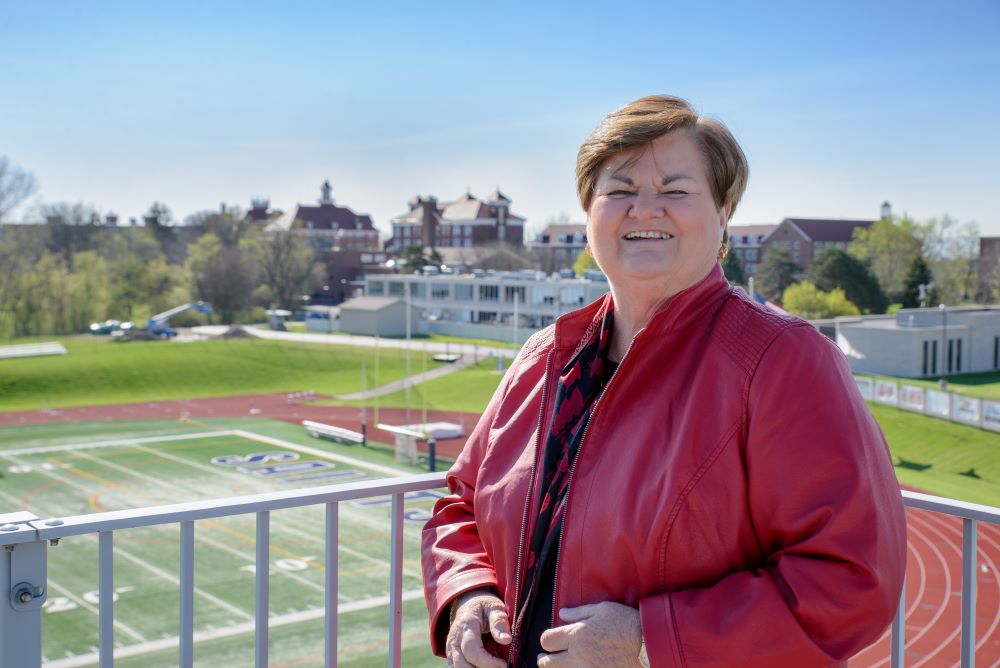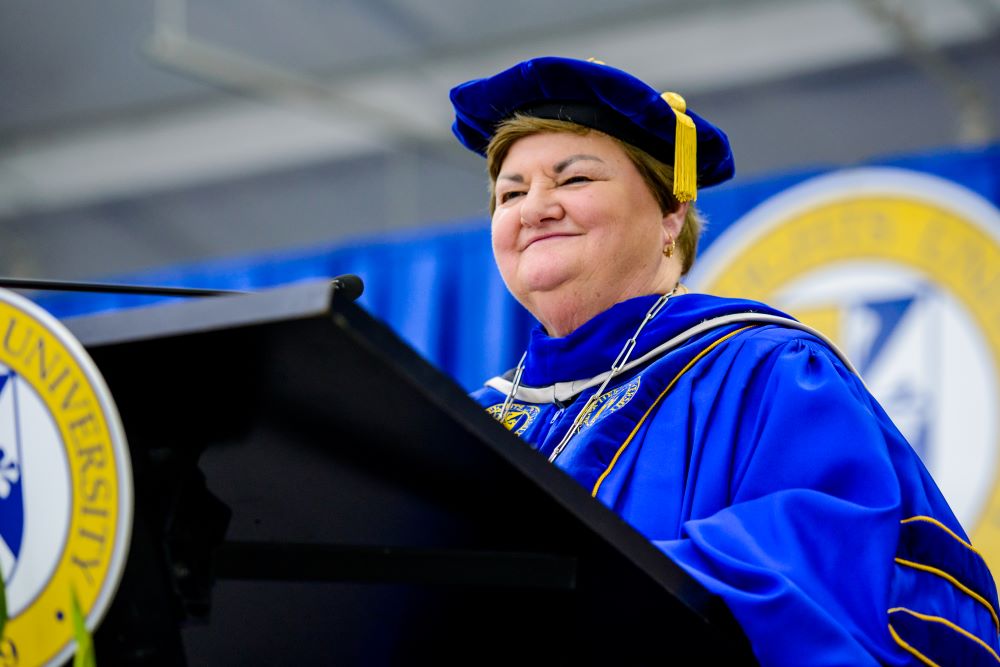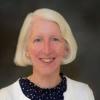
Sr. Peg Albert overlooks the athletic stadium at Siena Heights University in Adrian, Michigan, where she served as president 2006-2023. Her favorite place on campus was the president's box at the stadium because she loved the view of the campus and the students. (Courtesy of Siena Heights University Marketing)
After a 40-year career in academia, Adrian Dominican Sr. Peg Albert, stepped down in July after 17 years as president of Siena Heights University in Adrian, Michigan,. From 1983 to 2006, she served as an associate professor of social work, counselor and executive vice president at Barry University in Miami before becoming the 10th president of Siena Heights.
Under her leadership, characterized by a student- and mission-centered approach, Siena Heights saw unprecedented growth in enrollment and campus facilities. In addition to establishing nursing, football and band programs, the university made physical improvements to residence halls, athletic facilities and the student union. In October, Siena Heights dedicated the Sister Peg Albert Social Work Simulation and Practice Lab, to honor Albert's history in social work and contributions to Siena Heights.
A recent case of COVID-19 and a broken arm have forced Albert to slow her pace, but she copes philosophically. "It's been a little bit restrictive," she admits. "But you know what? It teaches you something, too. I needed quiet, and that's good." Currently on sabbatical, she is listening for where God will call her to go next. "I'm open to wherever that is and whatever it is," she said.
Global Sisters Report: You became a sister before you earned a PhD. When you were discerning a religious vocation, did you expect to have an academic career?
Albert: [Laughs] No. It's funny. I worked in student services at Barry when I was coming to understand higher education, and I came up through that rank. When I was at Barry for 23 years, I had a number of different jobs, and my responsibilities kept increasing. When Siena needed a president, I got a call from the prioress of the congregation, who asked if I would be willing to put my name in the hat. You know, I just went where God called me.
Advertisement
You spent your career at two different Dominican universities. What characteristics distinguish a Dominican education?
Well, one of the things St. Dominic taught us was that study is very, very important. That doesn't mean just to study in a classroom, but also to study life. Study involves more than learning facts in a book. It's taking what you learn, reflecting on it, and perhaps looking at the world in a different way.
Siena Heights and Barry are both liberal arts educational institutions. We believe that you need a good foundation in those kinds of subjects in order to be a well-rounded person and a lifelong learner — but professional education is extremely important too. I think an adaptation that has been made over the years in higher education is integrating those two things into a holistic approach to what you study and what you do with your degree, and I think that has enriched people. Some people think, "Why do I have to take Shakespeare? Why do I have to take philosophy or theology?" But it gives you a different perspective on things, to see things differently. It helps you to be more open to things in our world and challenge yourself and what you think.
Do you have a favorite place on the campus at Siena Heights?
Well, this is going to sound funny. It's probably the president's box at the stadium. And the reason I say that is not necessarily the president's box itself. It's the view. When you look out, the view of the campus and the trees that are behind the field … I look at that and I think all things are possible. You see the joy on the students' faces and the excitement of the people in the stands and sometimes the heartbreak, which is part of life, too.
When I came there, the two goals I had were to increase enrollment and build more buildings that students needed. Through the generosity of a whole community of people working together, we did. I just stand there in awe sometimes at the goodness of God and the goodness of people and think, here is grace in action.
You brought a lot of cocurricular programs to Siena Heights. What is one memory that you will cherish?
I'll tell you a little story.
Our football team was losing terribly one day, and I thought, "Well, I'll go down and when the football team comes out for the second half, I'll tell them, 'Come on guys! You can do it!' "
So I went down there and this big kid stopped me and said, "Sister, I just have to say thank you for saving my life."
I said "What do you mean?" I didn't know anything about him except that he was one of our students.
He said, "Well, my brother is in prison, and I probably would have been there right with him if you hadn't started football. This has saved my life."
I went back up to the president's box and I said, "I don't care what the score is. We already won today."
I'll never forget that. It's not just a football field or soccer field or track. It's a place that gives people life and gives people opportunities who wouldn't otherwise have a chance to go to school. Those kinds of things bring me life — to see the life others have.

Adrian Dominican Sr. Peg Albert presides at a Siena Heights University commencement. She stepped down from her position as 10th president of the Adrian, Michigan, university in July 2023.(Courtesy of Siena Heights University Marketing)
What are some of the changes you've seen during your career in higher education?
Over the past 40 years in higher education there's been a lot of adaptations. Just think of what computers have done for higher education. You don't even have to go to the university anymore. You can do everything online. I think people miss something there, but for those who can't afford the time or the money to come to a campus and live on a campus, it makes education more accessible. That's one huge change.
Another big change is going to be artificial intelligence: How do you prepare people for the future? How do you decide when to use it and when not to? How do you keep developing relationships? I think there are a lot of questions to be answered in that whole area.
Part of the Dominican charism is a search for truth and openness to change. Change can be really difficult, though.
You know, we talk about letting go. "We've got to let go of this. We've got to let go of that." But we fail to see that by letting go, we embrace something else. From the loss to the embrace. It's like death and resurrection. Yeah I die, but there's a resurrection. I think that's really important.
I love our Dominican charism. It's challenging at times, which it should be. It shouldn't be a walk in the park. That makes it more life-giving, and prayer is the center of it all. We bring to prayer everything in our lives.
Do you have a favorite prayer?
I wouldn't say that I have a favorite prayer. I would say that reflecting on Scripture is the way I mostly pray. There are certain passages that I really like, that I could probably spend days on. I love the Gospels. I think they are so rich and teach us something and speak to our hearts and our souls in so many ways.
But prayer is an attitude, too. A lot of times I think to myself: The journey is the prayer. The journey you're on is the prayer. You're really never separated from it. It's always with you, because God's always with you. That's what prayer is: a relationship with God. You never really leave it. It's always there.




